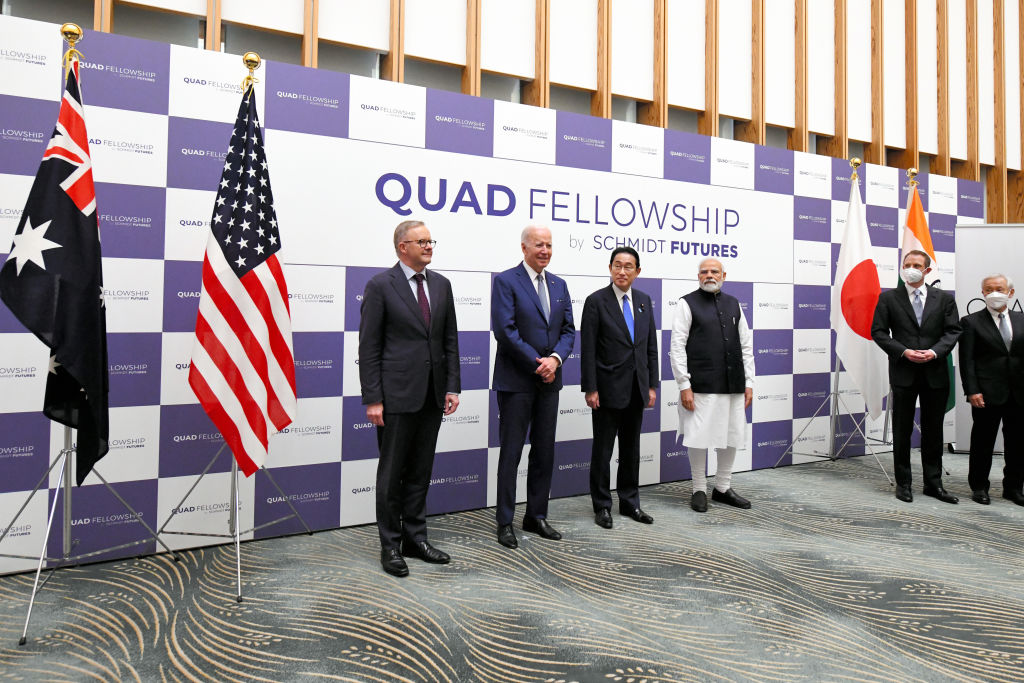Despite US President Joe Biden cancelling his trip to Australia and Papua New Guinea amid rancorous debt debates at home, leading to the cancellation of the Quad summit in Sydney, the show will go on. The four leaders of the United States, India, Japan and Australia are likely to meet on the sidelines of the G7 gathering in Hiroshima. The Quad will continue.
But to promote its aim of an “open, stable and prosperous Indo-Pacific”, the longevity of the Quad will depend not only on the leaders of today but those who follow. Shared values and shared interests are not enough. Sustainability comes from investing in the next generation of Quad managers. This needs to be a focus for the grouping.
The Indo-Pacific is home to 60 per cent of the world’s young people, with India having the largest youth population in the world. That’s 750 million young people who will bear the cost of regional instability, and the responsibility to make tangible deliverables on transnational issues including climate change, economic volatility, unemployment, regional conflicts, and other unanticipated sources of disruption.
A Quad-ready workforce
The inauguration of Schmidt Futures Quad Fellowship last year is welcome news and demonstrates that amplifying talent development will be a priority. Stimulating innovation in critical and emerging technologies should be a focus. The hope is that next-generation scientists from each country, including those who are recipients of the Quad Fellowship, can pursue multi-year collaborative opportunities such as joint research, private-public partnerships, and standard setting. They can also continue to deliver progress on existing initiatives such as the International Standards Cooperation Network, the Critical and Emerging Technologies Working Group, and the Quad Investors Network.
But the Quad also needs to ensure that the workforce now and into the future has sufficient skills to meet challenges. As evidenced by the Albanese government’s announcement of an AUKUS Submarine Workforce and Industry Strategy to scale up domestic nuclear industrial capacity, closing the gap on talent shortages is gaining more prominence in minilateral frameworks. If member countries want to build collective capacity, the Quad needs to address structural issues in the technology industry, such as recruitment deficiencies, retention, an aging workforce, and lacklustre employment benefits. Otherwise, the Quad will encounter stumbling blocks to maximise the innovation ecosystem in the long run.

To help meet the demands of the infrastructure working group and regional needs, vocational training should be included workforce and skills building exchanges. The Quad should collaborate closely with industry leaders from each member state to spearhead more workforce-specific programs so that tech companies, research institutes and infrastructure groups can pool more promising talent with diverse skill sets.
Next-generation issues
Youth leadership must also be harnessed. Last year, La Trobe Asia convened a “Quadmin” conference in Melbourne, with support from the US Embassy in Canberra, bringing together young leaders from each Quad country for discussion. Participants highlighted the importance of a “workforce to establish an overarching secure and trustworthy digital infrastructure”.
As digital natives, today’s youth possess unique skills and insights in combating misinformation and disinformation. These skills include an understanding of the factors that are contributing to a generational shift away from democracy, as well as insights to how mis- and disinformation proliferate on digital media platforms. Perceptions of democracy among young people in Australia and the United States are declining, with many questioning if democracy is a suitable model of government. Last year, Japan saw one of the lowest voting turn-outs of young people in years, which is emblematic of broader global trends of youth democratic dissatisfaction.
This is why the Quad working group on cyber challenges should include strengthening misinformation and disinformation resilience, to ensure that the region is better equipped to handle online challenges to democracy. Tightening cybersecurity measures, regularising programs such as the Quad Cyber Challenge, and incorporating input from private enterprises, non-profit organisations, and educational institutions will be critical in the years ahead.
Promoting Quad-aligned skills
A series of educational and professional exchanges on Quad working groups would also help strengthen a regional workforce on issues that fall within the jurisdiction of the Quad’s priorities. This can include expanding the Schmidt Fellows program (or alternatively, creating new initiatives) to include fields in human security including climate change and global health. Professional exchanges, similar to the US International Visitor Leadership Program will help to stimulate a Quad-capable workforce today – not just future graduates. Extending these exchanges to vocational training and workforces will help to sustain skills beyond those with tertiary qualifications.
With the Quad oriented towards delivering action through working groups, a capable workforce is key to ensuring the Quad delivers on its expectations. The Quad can only continue to foster progress through the distribution of public goods as the core of its principles if it harnesses next generation experts to build on the successes that have already been delivered and those causes that have yet to be realised.

